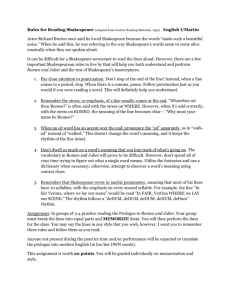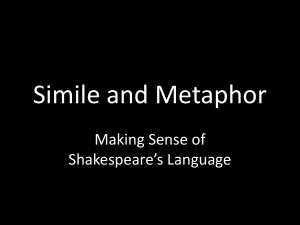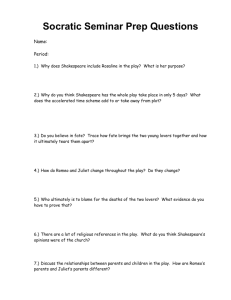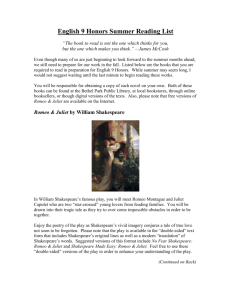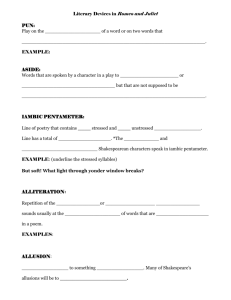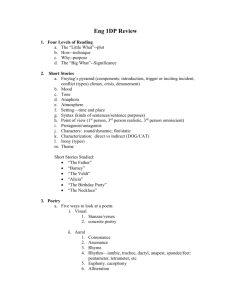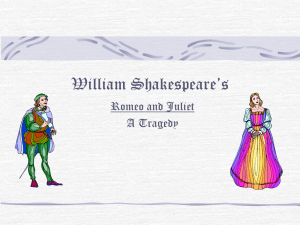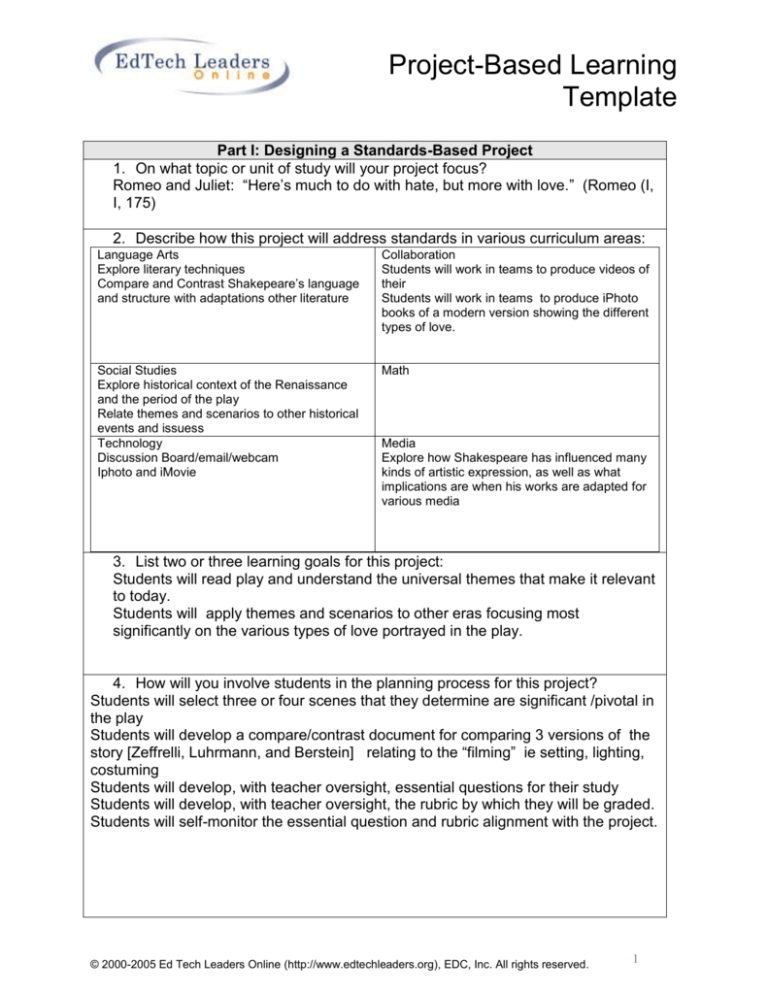
Project-Based Learning
Template
Part I: Designing a Standards-Based Project
1. On what topic or unit of study will your project focus?
Romeo and Juliet: “Here’s much to do with hate, but more with love.” (Romeo (I,
I, 175)
2. Describe how this project will address standards in various curriculum areas:
Language Arts
Explore literary techniques
Compare and Contrast Shakepeare’s language
and structure with adaptations other literature
Collaboration
Students will work in teams to produce videos of
their
Students will work in teams to produce iPhoto
books of a modern version showing the different
types of love.
Social Studies
Explore historical context of the Renaissance
and the period of the play
Relate themes and scenarios to other historical
events and issuess
Technology
Discussion Board/email/webcam
Iphoto and iMovie
Math
Media
Explore how Shakespeare has influenced many
kinds of artistic expression, as well as what
implications are when his works are adapted for
various media
3. List two or three learning goals for this project:
Students will read play and understand the universal themes that make it relevant
to today.
Students will apply themes and scenarios to other eras focusing most
significantly on the various types of love portrayed in the play.
4. How will you involve students in the planning process for this project?
Students will select three or four scenes that they determine are significant /pivotal in
the play
Students will develop a compare/contrast document for comparing 3 versions of the
story [Zeffrelli, Luhrmann, and Berstein] relating to the “filming” ie setting, lighting,
costuming
Students will develop, with teacher oversight, essential questions for their study
Students will develop, with teacher oversight, the rubric by which they will be graded.
Students will self-monitor the essential question and rubric alignment with the project.
© 2000-2005 Ed Tech Leaders Online (http://www.edtechleaders.org), EDC, Inc. All rights reserved.
1
5. After the project is selected, describe strategies you will use to help students
develop essential questions to be answered during their participation in this
project. (You can refer to http://www.tnellen.com/alt/essential.html to help you
craft your essential questions.)
Class discussion, read alouds, discussion with remote class using discussion on
Moodle, sharing materials via Moodle wikis
6. Describe the learning activities students will be engaged in during this project:
Teacher-Led
Individual Tasks
Team Investigations
Community Connections
Reading and
discussion of
Romeo and Juliet
Reading
Research into
historical
background
Online discussion
Tutorials for use of
cameras, creations
of story boards, and
use of iMovie
Collaboration
between students
from Warwick HS
and Central York
HS
Support of C4F
coaches Sue
Sheffer (CYSD) and
Fred Griffiths (WSD)
Viewing of
Zefferilli version
…of Luhrmann
version
…of West Side
Story
Re-viewing of
films
Re-reading of
scenes
Comparison and
Evaluation of
elements of film:
Setting, lighting,
characters, camera
angles
Collaboration
between students
from Warwick HS
and Central York
HS
Creation of story
board
Creation of prompt
document for video
production
Collaboration
between students
from Warwick HS
and Central York
HS
7. What strategies will you use to help students plan their final products to
present their findings and demonstrate their learning?
Share available samples of good student projects from You Tube; instruction in the
use of story boards; comparison to Zefferelli and Luhrmann versions; group sharing;
group and individual reflection in journals on Moodle (or on paper)
© 2000-2005 Ed Tech Leaders Online (http://www.edtechleaders.org), EDC, Inc. All rights reserved.
2
Project-Based Learning
Template
8. List the required materials and resources (other than technology).
Copies of Romeo and Juliet for each student
Brode, Douglas. Shakespeare in the Movies: From the Silent Era to Shakespeare
in Love. Oxford University Press, 2000.
Epstein, Norrie. The Friendly Shakespeare. Viking, 1990.
Bloom, Harold. Shakespeare: The Invention of the Human. Riverhead Books,
1998.
Copies of blank story boards
Website: http://int.cysd.k12.pa.us/makingmovies/index.htm
Part II: The Role of Technology
1. What technology tools and resources will be used in the project?
Moodle Discussion Board for student s to collaboration and making meaning
Moodle Wiki for exchange of information
Moodle journal for reflection
Computers with word processing to produce scripts and prompts
Video camera/ digital cameras to record student productions
Computers with iMovie/ iPhoto for editing student productions
Color copier for printing iPhoto books
Copies of Romeo and Juliet produced by Franco Zeffrelli, Buz Luhrmann, and
Leonard Bernstein (The West Side Story)
The internet:
tech-two.mit.edu/Shakespeare/works.html
Shakespeare.palomar.edu/
www.ulen.com/Shakespeare
www.youtube.com
© 2000-2005 Ed Tech Leaders Online (http://www.edtechleaders.org), EDC, Inc. All rights reserved.
3
2. How will technology tools be used in this learning unit and how will this use
help meet the learning goals?
The technology will be used to support the analysis, evaluation and synthesis
required by the project.
Students will be collaborating using wiki technology. Their collaboration will take
place during the classroom discussion/reading time.
After the play has been read, Warwick students will create iMovies and Central
York students will create iPhoto books. Each project will focus on theme of the
various types of love.
Part III: Assessment
1. Describe the expected final project product students will prepare and your
assessment strategies. The final project will be a book or a movie that will
demonstrate their understanding of the universality of the themes of love as
portrayed in Romeo and Juliet.
2. What interim or formative assessment strategies will you use during the
course of the project? Individual steps, journals, participation, wikis will be
monitored and assessed and students will be redirected or reinforced as
needed. Quick quizzes during read alouds.
3. How will students receive feedback about their performance?
Teacher will participate in discussion boards and wikis.
Teacher will conference with students
Teacher will give feedback on storyboards
© 2000-2005 Ed Tech Leaders Online (http://www.edtechleaders.org), EDC, Inc. All rights reserved.
4
Project-Based Learning
Template
Part IV: Timeline
Draft a timeline of the learning experiences for this project.
Week
Weeks 1-3
Weeks 4-5
Weeks 6
Learning Activities
Classrooms
reading and
discussion.
Storyboard the
iMovies and
iPhoto books
Gather materials
needed
Create media
Evaluate other
class’s projects
Standards
Assessment
Reading for
Understanding
Reading quizzes
Quick draws
Feedback
through the wiki
discussion
Rubric
Design and apply
advanced
multimedia
techniques
Evaluate the
effectiveness of
technology as a
presentation tool.
Rubric
Part V: Sample Project Planning Table for Students
1. Draft an explanation for students for using the Planning Table below and
completing their project:
Because you are working with others, it is important that you stay on track with
the time table. Meeting intermediate due dates will help you successfully
maximize your learning and complete this project. This timetable will help your
group keep track of what needs to be done, who is to do it, and when it should be
completed.
Tasks
Assigned to:
Description
Resources
Timeline
© 2000-2005 Ed Tech Leaders Online (http://www.edtechleaders.org), EDC, Inc. All rights reserved.
5
© 2000-2005 Ed Tech Leaders Online (http://www.edtechleaders.org), EDC, Inc. All rights reserved.
6


